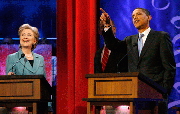
America seems poised for a great upheaval. While it would be rash to predict the winner of next November’s elections, there seems to be an overwhelming desire for change right across the United States. The polls suggest that 75 percent of Americans think their country is on the wrong track.
This is a stinging indictment of President George W. Bush, widely judged to be the worst president in modern American history. It is also an indictment of the Republican Party. The Republican ascendency in American politics has been shattered: Business interests, neo-conservatives and religious conservatives have all lost influence — a trend that started with the mid-term elections of 2006.
A change of leadership in the United States will have major repercussions throughout the world, not least in the Middle East, where Bush has embroiled the United States in two costly — and unwinnable — wars in Iraq and Afghanistan, not to speak of a dangerous confrontation with the world of Islam. To extract the U.S. from this predicament will be the first priority of the next president.
Two trends in the present election campaign are particularly significant. The first relates to money. Money plays a big role in American presidential elections because, all too often, major donors are in a position to influence policy. When money is plentiful, a candidate can also outspend his rival in television advertising — a great advantage in a country addicted to television.
This campaign has broken the mold. A striking feature has been the massive shift of financial resources away from the Republicans — who traditionally had the advantage — to the Democrats. In previous elections, relatively small special-interest groups — American Jews, for example — won great influence with both Democratic and Republican candidates by contributing generously to their campaign finances.

This time, Barack Obama, the leading Democratic candidate, has raised large sums in small amounts — often less than $100 — from hundreds of thousands of supporters via the internet. The role of the internet has marked a revolution in the way American elections are funded. It has freed Obama from dependence on major donors.
This has alarmed the Jewish lobby which has sought to smear Obama as a “secret Muslim” and as insufficiently supportive of Israel. Meanwhile, pro-Israeli neocons have given massive backing to the Republican candidate John McCain as the one man who can save them from the political wilderness.
A second significant trend of this campaign has to do with ideology. The public has clearly rejected Bush’s conservative views, especially in the field of foreign policy. His militarism, his pre-emptive wars and his unilateralism are distinctly out of favor. Over 60 percent of Americans consider that Bush’s foreign policy has weakened the United States. Instead, there has been a historic shift in favor of engagement with other countries.
Does this mean that the Democrats are certain to capture the White House? They will almost certainly win control of the House of Representatives and the Senate with large majorities. But winning the presidency is a different matter, and at this stage is wholly unpredictable.
Outdistanced by Barack Obama, Hillary Clinton’s chances of being the Democratic candidate have steadily declined. She suffers from hostility among male voters and among voters in rural areas. Americans, generally, seem more ready to elect an African-American than a woman.
Barack Obama is, therefore, likely to be the Democratic candidate, but can he beat John McCain for the presidency? Nothing is less certain. Obama needs to clear two main hurdles: his race and his acceptability on national security questions.
Obama enjoys massive support among young voters, but McCain is preferred by senior voters and by white blue-collar workers. Obama’s message is eloquent, intellectual, even philosophical. This may be a weakness in Middle America, where McCain’s simple language may be better understood. Many Americans might think Obama, 47, too young for the job; on the other hand, many more may think McCain — at 71 — is too old.
Obama is seen as inexperienced in matters of national security, whereas McCain, a war hero, is seen as someone who can keep America safe. If America were to suffer a major terrorist attack between now and the elections, McCain would undoubtedly benefit. One of McCain’s main strengths is that he is seen to be at odds with many Republicans on such issues as taxes, global warming and abortion.
The Americans are hostile to government in all its forms. They are angry at the rise in food and gasoline prices and at the long-term steady decline of real incomes. There is a fear of recession and a fear of dependence on foreign oil. All this is bad news for the Republicans who are thought to “own Washington” and who are held responsible for the present hardships. To win, McCain must run against his own party.
Barack Obama certainly has a chance of being America’s next president, but it is far too soon to write off John McCain.
Patrick Seale is a leading British writer on the Middle East, and the author of “The Struggle for Syria”; also, “Asad of Syria: The Struggle for the Middle East”; and “Abu Nidal: A Gun for Hire.” Copyright © 2008 Patrick Seale






Leave a Reply